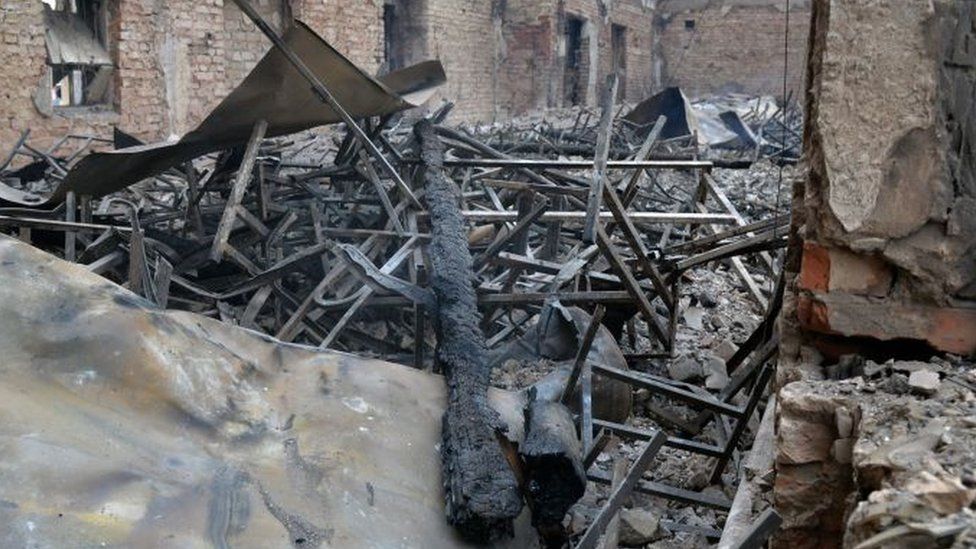Dozens of people have been killed in Russian missile strikes on Ukraine’s second city, Kharkiv, officials say.
“Kharkiv has just been massively fired upon by grads [rockets]. Dozens of dead and hundreds of wounded,” interior ministry adviser Anton Herashchenko said in a post on Facebook.
The attack came on the fifth day of the Russian invasion as negotiators from both sides held talks in Belarus.
Other major Ukrainian cities remain under attack from Russian forces.
Videos shared on social media showed rockets landing all over Kharkiv, in what some defence analysts described as typical of a cluster munition strike on a dense urban area.
The fighting has already caused more than half a million Ukrainians to flee their homes, while millions more are seeking refuge underground.
In the capital, Kyiv, the bulk of Russian forces are about 30km (19 miles) outside the north of the city, slowed by fierce Ukrainian resistance, according to the UK Ministry of Defence.
But street-level fighting continues in several parts of the city. Despite the danger, a two-day curfew has been lifted, with residents emerging from underground shelters to buy food and gather supplies.
‘Happy to stay alive’
Kasenya, who spent more than 36 hours underground, told the BBC she had managed to get home. “I can’t describe how I am feeling, I’m happy to stay alive and safe and just have the possibility to see my splendid and beautiful Kyiv,” she said.
Meanwhile, on the northern border with Belarus, Ukrainian and Russian officials are meeting for talks for the first time.
Hopes for a breakthrough are slim, but Ukrainian President Volodymyr Zelensky said there was a “small chance to end the war”.
The United Nations human rights chief, Michelle Bachelet, said millions of civilians were being forced to huddle in makeshift bomb shelters such as underground rail stations to escape explosions.
Since the invasion began on Thursday, her office has recorded 102 civilian deaths, including seven children – and more than 300 injured.
“The real figures are, I fear, considerably higher,” she said.
This video can not be played
To play this video you need to enable JavaScript in your browser.
To the north and north-east, Kharkiv and Chernihiv were also shelled by Russian forces overnight but remain in Ukraine’s control. Shells landed near a shopping centre in Kharkiv during the day, while fighting continued in the streets.
To the south, Russian forces are trying to take control of the key strategic port of Mariupol, near Russia-annexed Crimea. Ukraine denied reports that Zaporizhzhia, home to Europe’s largest nuclear power plant, had fallen into Russia hands.
Western nations have continued to levy sanctions and co-ordinate non-military action against Russia.
Russia’s currency, the rouble, slumped by 30% against the US dollar in early trading on Monday – a record low prompted by Western financial sanctions. Russia’s central bank more than doubled its interest rate – bringing it to 20% – in response.
Human rights group Amnesty International also accused Russia of indiscriminate use of weaponry on populated areas, something it said could constitute a war crime.
On Monday, Lithuania’s government said it would ask prosecutors at the International Criminal Court (ICC) in The Hague to investigate “war crimes and crimes against humanity” in Ukraine.


Russia attacks Ukraine: More coverage
- LIVE: Latest updates from on the ground
- THE BASICS: Why is Putin invading Ukraine?
- ZELENSKY: Comedian president rises to the moment
- DNIPRO: Terrified residents jolt into action
- MAPS: Tracking day four of Russia’s invasion
- IN DEPTH: Full coverage of the conflict
































